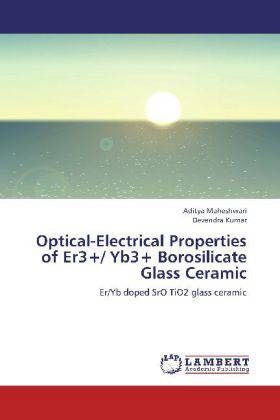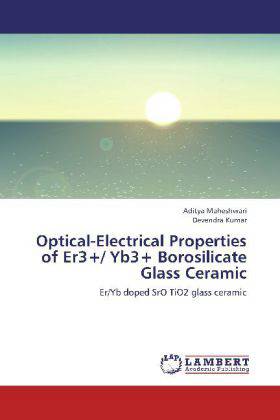
- Afhalen na 1 uur in een winkel met voorraad
- Gratis thuislevering in België vanaf € 30
- Ruim aanbod met 7 miljoen producten
- Afhalen na 1 uur in een winkel met voorraad
- Gratis thuislevering in België vanaf € 30
- Ruim aanbod met 7 miljoen producten
Zoeken
Optical-Electrical Properties of Er3+/ Yb3+ Borosilicate Glass Ceramic
Aditya Maheshwari, Devendra Kumar
Paperback | Engels
€ 74,45
+ 148 punten
Omschrijving
Glass Ceramic materials were developed around 1950 s. Thereafter many developments and researches have been carried out over these materials and now these become technologically important and useful in research, engineering and commercial fields. Various properties of glass ceramics depend over microstructure, phase assemblage and bulk chemical composition. Glass formation, workability, tendency towards nucleation as well as crystallization is controlled by the bulk chemical composition. Properties like density, coefficient of thermal expansion and chemical durability are controlled by phase assemblage i.e. proportion, type of crystallization and amorphous phases. Glass Ceramics have a wide range of microstructures, properties and applications. These are generally used in microwave radomes, microelectronic substrates, domestic cooker tops, astronotical telescopes, high integrity vacuum envelopes and biomedical applications. In present work, Er3+/ Yb3+ doped SrO.TiO2 borosilicate glass is prepared and its structural, optical and electrical characteristics are investigated
Specificaties
Betrokkenen
- Auteur(s):
- Uitgeverij:
Inhoud
- Aantal bladzijden:
- 148
- Taal:
- Engels
Eigenschappen
- Productcode (EAN):
- 9783848411214
- Verschijningsdatum:
- 02/11/2012
- Uitvoering:
- Paperback
- Afmetingen:
- 150 mm x 220 mm
- Gewicht:
- 227 g

Alleen bij Standaard Boekhandel
+ 148 punten op je klantenkaart van Standaard Boekhandel
Beoordelingen
We publiceren alleen reviews die voldoen aan de voorwaarden voor reviews. Bekijk onze voorwaarden voor reviews.







